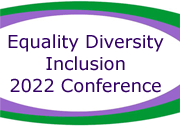*Apologies for any cross-postings*

14th Equality Diversity Inclusion (EDI) Conference 2022, 22-24 July 2022,
Cape Town, South Africa
EDI 2022 Call for Abstracts or Papers
Stream 14: Inclusive education in times of disruption
Email for submissions or inquiries: andri.georgiadou@nottingham.ac.uk
Format for submissions (abstracts or papers): Both
Deadline: April 14th
Organization of the stream: We are planning for a hybrid format, with attendees being able to attend in person or online.
Stream convenors:
Andri Georgiadou, University of Nottingham
Eleni Damianidou, European University of Cyprus
Christina Roy
Stream Outline
The disruption caused by the COVID-19 pandemic posed great risks to students and especially disabled and disadvantaged ones, not because of health-related conditions, but due to the pre-existing entrenched inequalities that led to widened disparities, shortcomings in the provision of educational support and practices of discrimination and exclusion (Twardzik, Williams, & Meshesha, 2021). At the same time, the disablist attitudes that undergird exclusion were enhanced and facilitated by the general fear of people worldwide, who supported closure, despite the tremendous cost for less advantaged people that were actually put at high risk, in terms of opportunities and well-being (Georgiadou et. al., 2021; Georgiadou & Antonacopoulou. 2021).
A holistic approach to education – that addresses students' learning, social and emotional needs – is crucial, especially in times of crisis. Educational institutions closures related to the current disruption by the pandemic mean that students from diverse backgrounds who are more at risk of increased vulnerability are less likely to receive the support and extra services they need, and the gap between students that experience additional barriers and that do not might widen. Closures can also have considerable effects on students' sense of belonging to schools and universities and their feelings of self-worth – these are key for inclusion in education (Damianidou & Georgiadou, 2022).
This stream therefore, explores the utilisation of the existing theories in order to enhance our understanding of how can education be inclusive in times of disruption. Currently, it tends to be organized based on a universal prototype of the powerful and thereby purportedly eligible to learn student, within a business-like model of education that raises barriers to the inclusion of disabled children and perpetuates inequity, so this stream seeks to address the need to respect students' right to equal opportunities in quality learning, particularly in times of disruption, when the stereotypes about eligibility to be educated are more evident than ever before. Finally, the important role of educators needs to be addressed, who need to resist the pressure to conform to the powerful.
This stream invites theoretically informed papers, empirically based ones as well as research posters from a range of disciplines that explore the nature of inclusive education, the impact on individuals and the organisational level of analysis. Moreover, papers could explore the identification of those activities that can be entered into force so as to effectively implement an educational strategy that incorporates inclusion as its key pillar.
Possible themes include:
Conceptual approaches to inclusive education; inclusive education and disruption; migration and human rights; inclusive education related discourses of management and leadership; inclusive education: experiences and outcomes; preparing educators for inclusive education; ableism and education; vulnerability in education; critical pedagogy in inclusive education; intersectionality in inclusive education.
Keywords
Inclusion, education, disruption.
References
Damianidou, E. and Georgiadou, A. (2022) Keeping students close or afar? Whom, how and what for. Teachers and Teaching: Theory and Practice. https://doi.org/10.1080/13540602.2022.2062728
Georgiadou, A. and Antonacopoulou, E. (2021) Leading Through Social Distancing: The Future of Work, Corporations and Leadership from Home. Gender, Work & Organization, 28, 749-767.
Georgiadou, A., Metcalfe, B.D., von Lockette, N.D., Groutsis, D. and Ozkazanc-Pan, B. (2021) Gender, embodiment and identity in organizations. Gender, Work & Organization, 28(5).
Twardzik, E., Williams, M., & Meshesha, H. (2021). Disability During a Pandemic: Student Reflections on Risk, Inequity, and Opportunity. American Journal of Public Health, 111 (1), 85-87.
Best wishes,
Dr. Andri Georgiadou, FHEA, PhD, MSc, MBA, PgCert, BSc |
Associate Professor, Nottingham University Business School
Director of MSc Human Resource Management and Organisation
Director, Equality Inclusion Diversity Center
Deputy Chair and Vice Chair Events for Academy of International Business (AIB) Western Europe chapter
Elected Representative-at-Large of the Management Education and Development (MED) Division of the Academy of Management (AOM)
Review Editor International Studies of Management & Organization (ISMO)
Editorial Review Board member Gender, Work & Organization (GWO)
University of Nottingham
Room C31, Business North School, Wollaton Rd, Nottingham, NG8 1BB
Email: andri.georgiadou@nottingham.ac.uk
Call for papers in Journal of Organizational Behavior (ABS: 4, IF: 8.174):
Working from everywhere: The future of work and inclusive organizational behavior (IOB)
Call for papers in European Management Review (ABS:3, IF: 2.534):
Re-Imagining the Workplace of the Future
Latest papers:
Gender, Bodies and Identities in Organization: Postcolonial Critiques. Gender, Work & Organization (ABS: 3, IF: 3.465). https://doi.org/10.1111/gwao.12745
The interaction between gender and informal social networks: An East Asian perspective. Human Resource Management Journal (ABS: 4*, IF: 5.039). https://doi.org/10.1111/1748-8583.12347
'Look at you!': Disembodiment between ugly bodies and able minds. Gender, Work & Organization (ABS: 3, IF: 3.465). https://doi.org/10.1111/gwao.12648
Leading Through Social Distancing: The Future of Work, Corporations and Leadership from Home. Gender, Work & Organization (ABS: 3, IF: 3.465). https://doi.org/10.1111/gwao.12533
Latest books:
Diversity within Diversity Management: Country Based Perspectives
Diversity within Diversity Management: Types of Diversity in Organizations